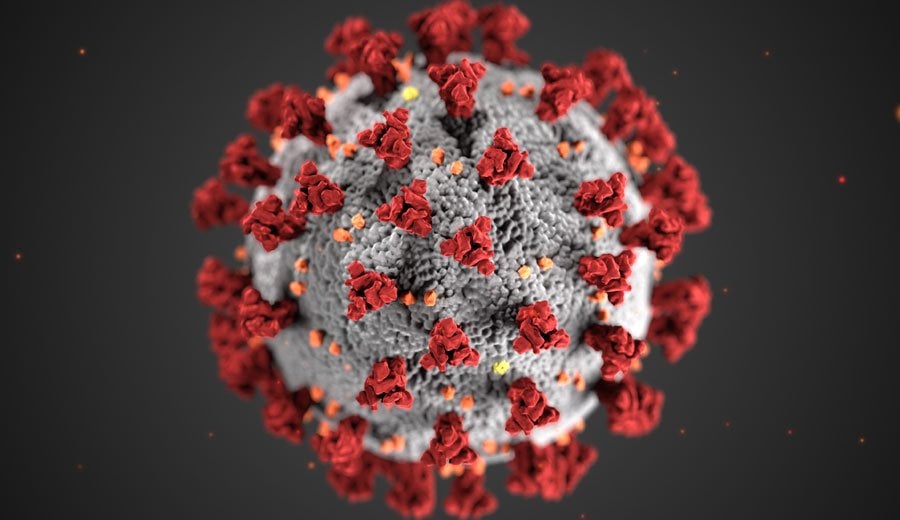B.1.1.7 variant linked to 55% higher mortality compared to other strains of SARS-CoV-2
15 March 2021 London School of Hygiene & Tropical Medicine London School of Hygiene & Tropical Medicine https://lshtm.ac.uk/themes/custom/lshtm/images/lshtm-logo-black.png
Caption: illustration of COVID-19. Credit CDC/Alissa Eckert
The B.1.1.7 variant is very likely to cause more severe illness than pre-existing SARS-CoV-2 variants, according to new research published in Nature.
The research team at the London School of Hygiene & Tropical Medicine analysed the results of more than two million COVID-19 community tests in England between November 2020 and February 2021.
Linking the test results to a comprehensive database of COVID-19 deaths, they estimated that B.1.1.7 infection was associated with 55% (95% confidence interval 39–72%) higher mortality compared to other strains of SARS-CoV-2 over this time period.
For example, out of 1,000 people in their 60s who test positive for the old variant, six of them might be expected to die from COVID-19 in the four weeks following the test. But this rises to about nine with the B.1.1.7 variant.
The authors concluded that the emergence of new SARS-CoV-2 variants such as B.1.1.7 threatens to cancel out the improvements in COVID-19 treatment that were made over the course of 2020. This work highlights the importance of vaccination programmes to control the spread of the coronavirus.
The findings build on recent research by LSHTM, published in Science, which concluded that this new variant is 43–90% more transmissible than pre-existing variants circulating in England.
Researchers around the world have been working to establish if these variants also cause more severe disease, a threat which this new study aimed to shed more light on.
Dr Nick Davies, lead author from LSHTM’s Centre for the Mathematical Modelling of Infectious Diseases, said:
"England has suffered an enormous toll from B.1.1.7 in the last few months, with 42,000 COVID-19 deaths in January and February 2021 alone. In spite of substantial advances in COVID-19 treatment, we have already seen more deaths in 2021 than we did over the first eight months of the pandemic in 2020. Our work helps to explain why.
“The B.1.1.7 variant is more transmissible, and our research provides strong evidence that is also causes more severe illness. This should serve as a warning to other countries that they need to remain vigilant against B.1.1.7, which has already spread to over 90 countries worldwide."
Over the last three months, the world has entered a new phase of the COVID-19 pandemic. While life-saving vaccines against COVID-19 have started to be rolled out in many countries across the globe, SARS-CoV-2, like all viruses, has mutated over time.
Researchers have tracked hundreds of variants of the coronavirus since it was first detected in Wuhan in December 2019. Three new variants of particular concern have emerged in Britain, South Africa, and Brazil. In recent work, these three new variants have been found to spread much more quickly than older variants of SARS-CoV-2. The B.1.1.7 variant was first detected in Kent, southeast England, in September 2020.
In the UK, COVID-19 community tests — such as those used in home testing kits, drive-in testing centres and screening programmes in care and nursing homes — are analysed by a network of laboratories across the country.
The researchers analysed the results of more than 2 million of these tests from between November 2020 and February 2021, a period in which B.1.1.7 spread from less than 0.1% to more than 99% of all community tests. Laboratory tests were able to detect whether the infection was due to the B.1.1.7 variant or not.
In the analysis investigating the link between the variant type and the risk of mortality, the team controlled for the age, sex, ethnicity, deprivation level and living arrangement (residential, care home, or other) of each test-taker, and compared rates of death among individuals testing positive with and without B.1.1.7 who live in the same local authority and took their test on the same day.
Professor Ruth Keogh, study senior author, said "We considered the possibility that any link between being infected with B.1.1.7 variant and risk of mortality could be due to other factors and not necessarily a causal link. However, we were able to avoid seeing spurious associations by controlling for several individual characteristics in addition to location and date of test in the analysis, which we used to control for changes in the availability of hospital services over time and geographically, as the spread of B.1.1.7 led to substantial pressures on the National Health Service.”
Dr Karla Diaz-Ordaz, co-senior author, added “Our findings are robust to different analysis decisions, for example, correcting for misclassification of the potential variant, as well as accounting for missing variant information, or whether we looked at deaths within 28 or 60 days of the test.”
The authors acknowledge limitations of their work, including the possibility that there could be factors relating to B.1.1.7 infection and risk of mortality that were not fully controlled in the analysis. However, the authors believe they have accounted for the most important factors that could result in spurious associations. The findings are now also supported by similar findings from related studies.
Publication
Nicholas G. Davies, Christopher I. Jarvis, CMMID COVID-19 Working Group, W. John Edmunds, Nicholas P. Jewell, Karla Diaz-Ordaz & Ruth H. Keogh. Increased mortality in community-tested cases of SARS-CoV-2 lineage B.1.1.7. Nature. DOI:10.1038/s41586-021-03426-1.
If you enjoyed this article and would like to build a career in global health, we offer a range of MSc programmes covering health and data, infectious and tropical diseases, population health, and public health and policy.
Available on campus or online, including flexible study that works around your work and home life, be part of a global community at the UK's no.1 public health university.